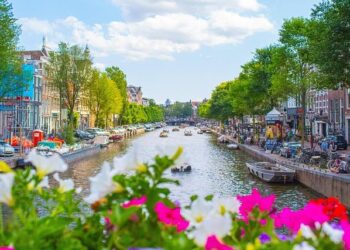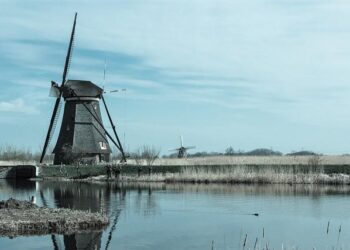Students from the Oregon Institute of Technology recently embarked on an educational journey to the Netherlands, immersing themselves in innovative approaches to urban design and sustainable living. Focusing on the concepts of livable cities and circular societies, the visit provided firsthand insights into cutting-edge practices that prioritize environmental responsibility, resource efficiency, and community well-being. This international experience is part of Oregon Tech’s commitment to preparing students for the challenges of building resilient, future-focused communities.
Oregon Tech Students Investigate Innovative Urban Planning Approaches in the Netherlands
During an immersive study tour in the Netherlands, Oregon Tech students had the unique opportunity to engage firsthand with cutting-edge urban planning projects that prioritize sustainability and community well-being. By visiting innovative neighborhoods and circular economy initiatives, they explored how Dutch cities implement green infrastructure, renewable energy solutions, and integrated public transport systems to foster highly livable environments. The students gained valuable insights into the design principles behind pedestrian-friendly spaces, multifunctional parks, and adaptive reuse of industrial sites, which all work together to reduce environmental impact while enhancing quality of life.
Key focuses of the investigation included:
- Integration of circular economy principles in urban development
- Innovative water management and flood resilience strategies
- Community-led governance models supporting social inclusivity
- Smart technology applications that optimize city resource use
| Urban Element | Innovative Approach | Impact |
|---|---|---|
| Green Roofs | Stormwater retention & biodiversity | Reduced runoff, increased habitat |
| Bike Infrastructure | Extensive dedicated lanes & parking | High modal share, lower emissions |
| Waste Processing | Neighborhood sorting hubs | Enhanced recycling rates |
Exploring Circular Economies and Sustainable Living Models in Dutch Communities
During their immersive experience in the Netherlands, Oregon Tech students engaged deeply with communities pioneering circular economy principles that challenge traditional linear consumption models. These Dutch initiatives emphasize waste reduction by designing systems where materials continuously loop back into production cycles, minimizing environmental footprints. Key features observed included urban composting networks, community-led repair cafés, and innovative upcycling hubs that transform discarded items into valuable resources. By studying these practices, students gained firsthand insight into how localized efforts effectively contribute to sustainable resource management and social resilience.
Students also explored various sustainable living models rooted in cooperative governance and shared infrastructure. Emphasis was placed on neighborhood-scale projects such as energy-positive housing clusters using solar technology and rainwater harvesting systems integrated with smart urban planning. The collaborative spirit driving these projects was evident in their inclusive decision-making processes, aiming to balance ecological, economic, and social benefits. Below is a snapshot of some key components that define the sustainability frameworks observed:
| Component | Description | Community Impact |
|---|---|---|
| Zero-Waste Shops | Stores encouraging package-free purchases | Reduces single-use plastic |
| Shared E-mobility | Electric bike and car-sharing schemes | Lower emissions & traffic congestion |
| Urban Gardens | Community-managed green spaces | Enhances food sovereignty |
Recommendations for Integrating Livable City Concepts into Oregon’s Urban Development
To successfully incorporate livable city principles into Oregon’s urban framework, it is essential to prioritize community-centric planning that fosters social equity and environmental sustainability. Drawing inspiration from Dutch models, planners should emphasize mixed-use development, pedestrian-friendly infrastructure, and accessible green spaces. Moreover, encouraging local governments to collaborate with residents through participatory design processes ensures that urban environments reflect the diverse needs of their populations. Key strategies include:
- Implementing comprehensive public transit networks to reduce car dependence
- Incorporating green roofs and urban gardens to enhance biodiversity
- Promoting energy-efficient building codes to lower carbon footprints
- Creating affordable housing options within walking distance of essential services
To facilitate these ambitious goals, policymakers must invest in innovative circular economy frameworks that minimize waste and optimize resource use. A collaborative approach between industry, academia, and civic organizations can drive practical solutions that align with Oregon’s sustainability targets. The following table exemplifies potential circular strategies tailored for urban Oregon:
| Key Circular Strategy | Urban Application | Expected Benefit |
|---|---|---|
| Material Reuse Initiatives | Construction and demolition waste recycling | Reduced landfill use & lower resource extraction |
| Water Recirculation Systems | Greywater treatment for irrigation | Conservation of fresh water resources |
| Shared Mobility Services | Bikesharing and electric car fleets | Lower emissions & decreased traffic congestion |
| Smart Waste Management | Sensor-enabled recycling bins | Improved sorting efficiency and reduced contamination |
Wrapping Up
As their study tour in the Netherlands concludes, Oregon Tech students return with fresh insights and inspired perspectives on sustainable urban planning and circular economies. By engaging directly with innovative projects and pioneering communities, these future engineers and planners are better equipped to contribute to the development of livable, resilient cities back home. The experience underscores Oregon Tech’s commitment to providing practical, global learning opportunities that address today’s most pressing environmental and societal challenges.
















